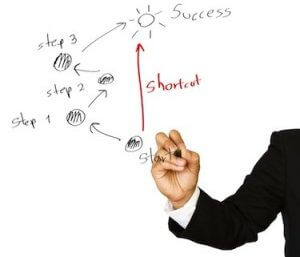 It has been exciting time for engineers and technologist, where we have been witnessing mushrooming numbers of young potential technology companies that are founded by engineers in these recent decades. Equipped with cutting edge technical know‐how, they are preparing to create the next big innovation with the dream of turning them into “Entrepreneur of the Year” or “Most Promising Start-Up of the Year” featured in BusinessWeek in the next 6 months. Little that they realize some personalities or “traits” that they possessed or are trained over the years as good engineers might put their business at stake.
It has been exciting time for engineers and technologist, where we have been witnessing mushrooming numbers of young potential technology companies that are founded by engineers in these recent decades. Equipped with cutting edge technical know‐how, they are preparing to create the next big innovation with the dream of turning them into “Entrepreneur of the Year” or “Most Promising Start-Up of the Year” featured in BusinessWeek in the next 6 months. Little that they realize some personalities or “traits” that they possessed or are trained over the years as good engineers might put their business at stake.
Introduction
There is nothing more gratifying than the recent decades for those individuals who are in the engineering and technology profession. Since the early 1980s, there is a massive growth of high-tech businesses. These new businesses operate very differently than their traditional peers, such as trading, logistics, manufacturing, banking, and the like. Their business model has very strong focus on its people and knowledge to create values by providing radical solution to problems in ways that the market does not expect. More interestingly, these businesses are founded by engineers or techies who are trained in their profession to have strong analytical and problem solving skills. To mention a few examples: Bill Gates founded Microsoft in 1975 to develop programming languages for various computer systems. He was a computing science student at Harvard College at that time. Leonard Bosack was a computer engineer before he started Cisco Systems in 1984 to create a multi-protocol router that is instrumental in making Internet possible. Acer was created by Stan Shih who was an electronics engineer in 1976. It started off as a distributor of electronic components and microprocessor technologies, and emerged as a PC manufacturer over time. Mark Chang is the founder of JobStreet.com, a company that was formed in 1997 to provide recruitment services over the Internet. He used to be a mechanical engineer prior to that.
A common characteristic among the founders of these companies is, apart from their strong technical background, they do not have extensive exposure to the business world before starting up their business. Although they are proficient in their technical skills and knowledge, as I tried reflecting back on my past experience in various technical domains, and observing technical individuals around me, there are certain personalities or traits within us that are trained over the years as good engineers, which are not really suitable for business start-ups, and to certain extent might even put our business at risk. This article is to share with you my experience over the years, started off as a software developer, and gradually gained my business sense as I ventured into various businesses. The article may contain statements that are blunt and harsh as the objective is to ensure the intended message is presented in a more straightforward manner to prevent any misinterpretation. While you may find the article seems to be prejudice and stereotype in certain sense, I had done a great length of research on the subject to generalize all facts and cases presented here. In order to get the most benefits out of this article, it is advisable to read and understand with an open mind.
Trait #1 – Talking too much technical
“Our product has this intelligent energy analysis module, where it basically uses regression analysis on built-in data cube that allows you to simulate and predict your future energy usage pattern.”
Does that sound familiar to you? If you are like many techies, we tend to be mistaken of selling our product by promoting its features and technology. Unless your audience is technically inclined, otherwise most customers usually do not care much about the internal working (technology), not to mention they might not even able to comprehend it very well. You should instead tell your customer more on how your products can help them, what problem does it solves, how to use it, etc. It is better to avoid talking about your product features before your customer has bought into its benefits. In order to build your rapport quickly, you can share your experience and insights about your customer’s industry, try to relate to your opinion on the problems, needs, and dynamics in the industry. That can greatly increase your credibility in customer’s eyes to make your sales easier.
Trait #2 – Being a Chief Everything Officer (CEO)
“It will be great if we develop our graphics engine based on my PhD thesis, along with the path optimization algorithm that I learnt few months ago.”
We techie are very proud of our technical capabilities to solve virtually any problems. Sometimes, we feel too proud of it until we want to do everything ourselves so that we can get all the credits. Because of that, partnership and strategic alliance is never something that often comes to our mind. What we overlook in this context is the importance of time to market for our product and solution. With limited resources, we should relentlessly look for strategic alliance, partnership, licensing, and the like on the areas that are not our core business offering, which we can leverage on to get into the market as quickly as possible. We had overstressed on our technology superiority, where the fact is compelling product value proposition is more important. High technology does not ensure our business success, good product does. High technology is only good as your barrier of entry for your medium to long term business goals.
Trait #3 – Poor people management
“I am a lot more competent and efficient than my employees, might as well I do it all by myself. What’s the point if I still have to tidy up what they have done.”
Let’s face it, we techie are not the most people oriented person. We often feel that we are a lot more competent than our subordinates, which in most of the time we really are. (Unless you hire someone who is better than you, which in fact you should!) As a result, we end up trying to do all by ourselves instead of delegating to others. Then as your business expands, you will realize sooner or later you will need people to help you out so that you can focus on the tasks that really worth your time. In order to delegate, first we need to lower our expectation level, loose up a bit, let go and let others step in. It is not easy during the initial stage, but we just have to change our attitude and learn to trust our employees, provide room for learning and failure, set up an atmosphere of encouragement. A lot of techies lose control when they grow due to lack of delegation, hiring and training people. Therefore, we need to prepare for delegation to accommodate growth of company.
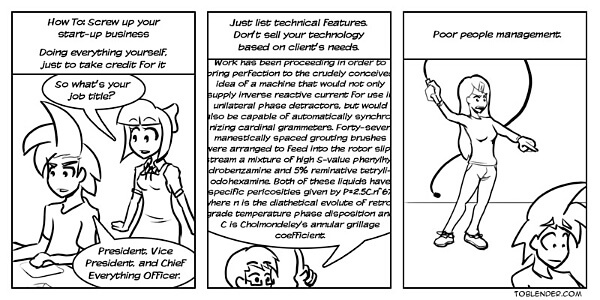
Trait #4 – Thinking too far
“Let’s make our core engine more robust and generic so that we can sell it in the future for additional revenue. It will be good if we include these functions as well as I believe we might need them later.”
Perhaps it is our strength in analytical skills and abstract thinking, we techie tend to focus too much energy on our long term goals. This often result in creating too much generalized “just in case” components, features, and functionalities during product development. With limited resources, we should always be mindful of the short term return that ensures survival of our business. When overly emphasize on the long term goals, everything is strategic with no projects targeting for short term profitability. This can cause competitive problems if the long term opportunities are high risk and time consuming, where competitors can take advantage of your immediate shortcomings. But having say that, too short term focus will make a company too reactive, than proactive, which can eventually succumb to competition. My advice is to focus on achieving the short term goals, while aligning them towards your long term goals. This means that you need to work on the short term goals in such way that it makes room for your long term opportunities. You should think twice when deciding on developing any “dead end solution”. Any of your short term measure must not sacrifice your longer term opportunities.
Trait #5 – Analyzing too much
“That problem can be actually solved with that algorithm. But what if there are certain rare occasion where… What if under these circumstances… What if… (Endless what if’s.)”\
The baggage that comes with good problem analyst and solver is thinking too much, which, to the extent until we are bogged down by the amount of analysis and feel overwhelmed with the project and task to come to a rational conclusion. This is called “analysis paralysis”, a situation where you are frozen by having too many options with no clear answers, thus making you slow to decide as trying to wait for more facts. This “disease” typically afflicts techie as we often need to wait for all information to be in before making decision, which rarely happens in business as you usually will never have all the facts nor will there ever be riskless decisions. We need to learn to trust our instinct to decide in this situation. Sometimes, we just have to do it without thinking too much, bearing in mind there is no such thing as mistakes or wrong moves, only lessons learnt. You will soon realize most of the time, you need to try out your ideas in order to really find out whether they work for your business.
Trait #6 – Misunderstanding business networking
“I am busy developing my product and I don’t have time to network. I will start networking and building up my contacts when I start selling my product.”
Most techies never see business networking as part of their core business activities. Perhaps networking is never really our second nature. But more than anything else, we wrongly understood business networking as selling. The truth is, networking is never about selling. In contrary to what you have heard from those short sighted sales people, the true philosophy of networking is about building up relationships, either with your customers or other business owners. People often deal with those whom they trust, thus you need to gradually build these relationship over time to build your network of contacts that provide support, information, and business referrals. Networking is about forming and nurturing mutually beneficial relationships, which brings you new connections of whom will become good customers. This will ultimately bring you steady stream of business to ensure sustainability and profitability. Business success is about relationships, and building relationships takes time, so regardless of whether you are marketing your product, you have to invest substantial amount of time in business networking.
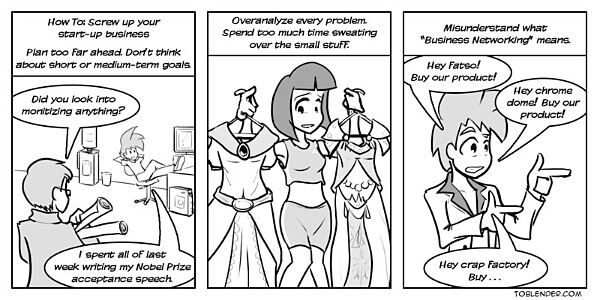
Trait #7 – Being unnecessarily perfectionist
“I tell you, this user interface will definitely look a lot better if we use some of the user controls that I found last week. Also, if we can implement a few shortcuts and tool bar buttons, it will make our software looks more complete and useful.”
Perfectionist is good only if it does not affect your overall efficiency and productivity. With the limited resources that you have during startup, you can’t have the best of everything. You need to be pragmatic. From time to time, try standing back to relocate your main focus, niche, and primary competitive advantage, and then divert most of your energy on that. Be a prioritization machine, and always conscious of your current objective to create just what is needed to meet the current objective and avoid the risk of feature creep. Once you have more resources, then you have more breathing space to consider what is the next best things to focus for improvement.
Trait #8 – Being ignorant on the sales process
“Build it and they will come. We just have to do mass advertising and emailing to announce our cool product to the world once it is released, and then wait for $$$ to come.”
We techie often think selling is a no-brainer work, which is a lot easier compare to programming. In reality, selling and marketing can be as challenging as, if not more challenging than programming. The reason is because there is no hard and fast rule on successful selling, nor any “sure win” strategy in marketing. It takes more than science and logical thinking to successfully tackle the market dynamics and psychology. The customers often have to be educated about why they need our product. Thus, it is important to know that selling to the first customer usually takes longer than we want or expect. We need to think of various strategies for overcoming customer inertia to change, which is even more critical if you are developing a unique product that the market does not know. The key here is always developing your product with thinking of how to sell in mind. You have to think critically on how the product features and functionalities affect the sales cycle and product lifecycle. Each stage of the sales cycle and product lifecycle will probably need different resources, tools, and skills to optimize sales results. Thus, it is important not to spend too much on product development and overlook the budget requirements and process of sales and marketing.
Trait #9 – Being defensive on changes
“Sorry, but I can show how your suggestion can be done thru this user interface too. In fact, I would prefer we stick to this interface as I had done a lot of research before developing it.”
Whenever our customers suggest some changes or a new feature to our product, rather than defending blatantly our design and decisions (which most techies tend to do), the customers will be more appreciative if we simply thank them, validate their ideas, and leave our justifications later. We always think that our product is the best thing, which the fact is, what customers think, what they want, is more important. If you do most of the talking, it’s hard to learn much about your customer. Instead, try to ask powerful questions that are open-ended and allow your customers or prospects to give you more information or insight. Rather than we keep schooling the customers, it is more beneficial to let them teach us. An interesting note is that a lot of entrepreneurs often end up doing business, products and services that is very different than what they thought customers need, and what they want to do. This reinforces the point that we need to learn by doing, listening, getting feedback, and adapting it into our business.
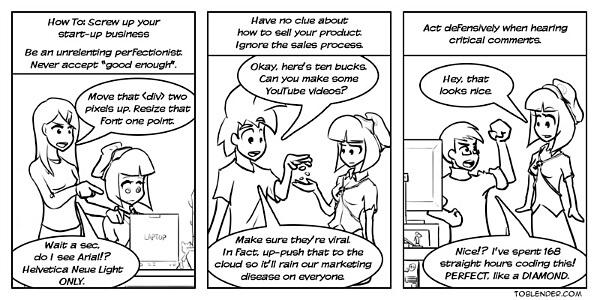
Trait #10 – Having weak determination
“Wow, this looks like going to be the next big thing! It is a lot more promising than what we are doing now. I think we should grasp the opportunity and do this now.”
As a techie, we are taught to be always at the forefront of technology. For that, we love new things, especially cutting edge technology. In our mind, we know that determination and focus is the key to success, but in our heart we are often struggling to resist the techie urge. The grass always seem greener on the other side of our fence, which in fact maybe due to our shallow understanding of the other side. It is so easy to want to go off and do new things. Thus, it is important to constantly remind us to be persistent and patient. If you think about it, your clients might confuse if you try to do or offer too much. We must have a clear identity in the market at all times where our customers know exactly who we are, and what we do, what are our business objective and priority.
Conclusion
I had shared with you on some of the behaviors I believe we techies should be aware of, especially if you have plans to start up your own business in the future. If you can keep these in mind at all times throughout your entrepreneurship journey, I have no doubt that your business success will be just around the corner. Your technical skills combined with good sense in sales, marketing, and management, will make you a savvy businessman. Your insight in the business domain will allow you to create a viable and attractive business model for your customers, while your extensive technical knowledge will enable you to explore various implementation strategies and find one that best supports your business model and priorities. If you are developing a product, you are able to ensure it is both technically viable and economically sound with an actionable go to market strategy.
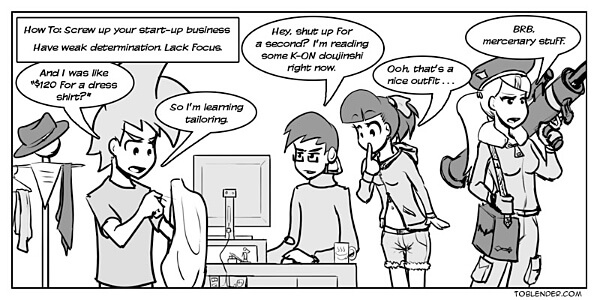
Acknowledgement
Many thanks to Alex and Danny at TOBlender.com for making this article more lively through the comic illustrations.

